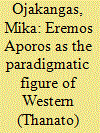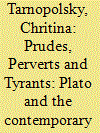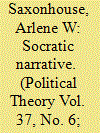| Srl | Item |
| 1 |
ID:
122993


|
|
|
|
|
| Publication |
2013.
|
| Summary/Abstract |
The originary figure of the Western political subject is neither the Aristotelian zoon politikon nor the Agambenian homo sacer but the Socratic eremos aporos. Like the Agambenian homo sacer, the Socratic eremos aporos is abandoned by his fellow citizens, not outside the polis but in the polis, being a refugee in his own city. He lives, as Callicles says of Socrates in Gorgias (486c), "in his city as an absolute outcast." Moreover, like the Agambenian homo sacer, the Socratic eremos aporos also lives in a state close to death-"in a state as close to death as possible," as Socrates says of himself in Phaedo (67d). However, there is a decisive difference between the Agambenian homo sacer and the Socratic eremos aporos. Unlike homo sacer, the Socratic political subject is not abandoned by the sovereign but by himself through his own traumatic self-accusation. Furthermore, although eremos aporos is also a "living corpse," he is not thereby at mercy of the sovereign. On the contrary, it is he who has become sovereign, not because he has somehow managed to sublate his condition as abandoned and forlorn subject, but because this condition is the condition of sovereign freedom. In other words, it is neither his biological life in the order of nature (zoe) nor his form of life in the symbolic order of the polis (bios), not even his exposure to the threat of imminent death (homo sacer), but his symbolic suicide that renders him a sovereign individual subjected to no one. By removing the subject from his proper place in the symbolic order of the polis, such a suicide not only discloses subject's unlimited responsibility but also renders him capable of transcending his limited position as a living being and becoming a thanatopolitical subject of his own biological death. Although such a subject also affirms life, life that is affirmed here is not mere life but sovereign life in the shade of the instinct of death.
|
|
|
|
|
|
|
|
|
|
|
|
|
|
|
|
| 2 |
ID:
053827


|
|
|
| 3 |
ID:
092139


|
|
|
|
|
| Publication |
2009.
|
| Summary/Abstract |
Plato wrote dialogues. While there has been attention to the dramatic elements of Plato's dialogues by a number of scholars, there has been much less attention to the narrative style of the dialogues. I argue that we should consider whether the dialogues are recited or presented like dramatic works with each character speaking his own words-or as a mixture of these narrative forms. By employing this interpretive tool to read the Republic, I illustrate how paying attention to the narrative style enables us to see a democratic Socrates who undermines readings of the Republic famously offered by Karl Popper and Leo Strauss. Plato appears then as neither a defender of the "closed society" nor an advocate of the elite rule of the wise over the many.
|
|
|
|
|
|
|
|
|
|
|
|
|
|
|
|